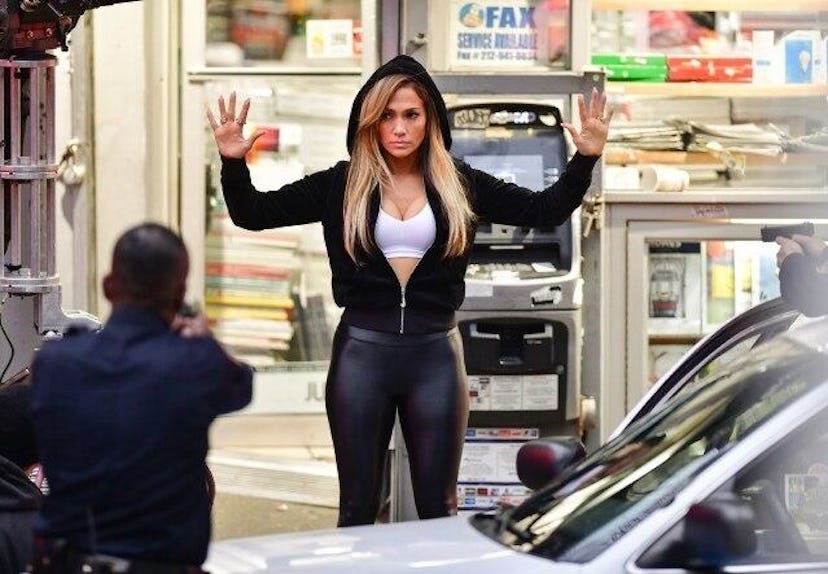The Hustlers Legal Drama, Explained

You’d be hard pressed to find anyone who’d mistake Hustlers for a biopic or documentary. And yet, the fact that it’s based on real life has always been part of the allure of the film, which is based on a 2015 New York magazine story about a crew of strippers who scammed their Wall Street clients out of hundreds of thousands of dollars. (Whether or not that was part of the draw for its all-star cast is unclear, but it certainly didn’t deter stars like Jennifer Lopez.)
Since its release in September, Hustlers has generated well over $150 million worldwide. Now, four months after it first hit theaters, Hustlers‘s roots in reality are coming back to bite it. Last year, Samantha Barbash—the real-life inspiration behind Lopez’s character, Ramona—made it clear that she was seriously considering suing Lopez. And while the lawsuit Barbash filed on Tuesday doesn’t name Lopez, it does name Nuyorican Productions—Lopez’s production company—along with STX Films.
Who is Samantha Barbash?
Known professionally as Samantha Foxx, Samantha Barbash is said to be the real-life inspiration behind Lopez’s character, Ramona. She started dancing when she was 19 and was in her thirties—”ancient by stripper standards,” Pressler wrote, though Barbash has been adamant that she was never a stripper—when the real-life events portrayed in Hustlers unfolded. After pleading guilty to conspiracy, assault, and grand larceny in exchange for five years probation, Barbash would eventually tell Pressler parts of her story. (Unlike Roselyn Keo, who was the basis for Constance Wu’s character of Destiny, she only spoke to Pressler on background.)
Why is she suing?
In the lawsuit filed on Tuesday, Barbash accuses both production companies of exploiting her character and likeness without her consent. She also claims that they defamed her—citing scenes like one in which Lopez is seen “using and manufacturing illegal substances in her home where she lived with her child”—and is seeking $20 million in compensation and an additional $20 million in punitive damages. “Defendants did not take caution to protect the rights of Ms Barbash by creating a fictionalized character, or by creating a composite of characters to render J-Lo’s character a new fictitious one,” the lawsuit reads. “Rather they engaged in a systematic effort to make it well-known that J-Lo was playing Ms. Barbash.”
Are Ramona and Samantha really that similar?
Yes—especially if we’re talking about Samantha circa 2007, when the events portrayed in the film took place. Both Ramona and 2007-era Samantha are single moms from the Bronx who, to use Pressler’s words, are “ancient by stripper standards.” Both have a distinct birthmark and lip piercing. Both harbor dreams of developing a swimwear line. Both were part of a nightlife crew that scammed wealthy men and Wall Street types out of hundreds of thousands of dollars, at times by drugging them. And both have been photographed flipping off cameras on their way out of a courthouse where they accepted a plea deal.
Of course, there are also differences between the pair. But the lawsuit is right in saying that the companies behind the film encouraged viewers to associate the film with the New York magazine story, and therefore to associate Ramona with Samantha. Julia Stiles portrays a reporter based on Pressler, who wrote the story that New York has now repackaged as “the real story behind the Hustlers movie starring Jennifer Lopez.” Her source Roselyn Keo, who was the basis for Constance Wu’s character of Destiny, joined Pressler at the film’s premiere, where the pair posed with Lopez and Scafaria on the red carpet. Overall, Barbash notes in her suit, the press tour repeatedly included discussions of the real-life events behind the film, apparently including details about her life such as where she worked.
Do the companies actually owe Barbash anything?
Perhaps not technically—hence why STX Films is already planning to “defend our right to tell factually based stories based on the public record.” Stories based on real-life events are told all the time, and often without compensation for their real-life subjects (especially those convicted of crimes). And it would be difficult, and arguably inadvisable, to set a legal precedent otherwise.
But the matter is a bit murkier than that. As Barbash has claimed in the lawsuit, and has previously claimed in interviews, the team behind Hustlers did seek to include Barbash in the production. But when they offered her “a minuscule amount” as compensation, Barbash declined. ” At the end of the day, I have bags that are worth more than what they wanted to pay me,” she told Vanity Fair in September. “I’m a businesswoman. J. Lo doesn’t work for free. Why would I?”
In the suit, Barbash says that the producers attempted to “obtain a consent and waiver,” but she refused to sign it, attempting to halt the film’s release in early 2019. “My client is offended that the defendants used her likeness to make over $150 million, defamed her character and tried to trick her into selling her rights to the production company for a mere $6,000,” a lawyer for Barbash told Rolling Stone.
What’s J.Lo’s role in all this?
To start, Lopez portrayed Ramona—a role that’s been generating Oscar buzz for months—and backed Hustlers with her production company. She’s also done her fair share of promoting the film—much of which has consisted of emphasizing her role in making Hustlers a reality. “I didn’t get paid a whole bunch of money for Hustlers,” she told GQ in November. “I did it for free and produced it. Like Jenny From the Block—I do what I love.” Though according to Barbash, she never attempted to make contact with the real-life Ramona over the course of telling her story.